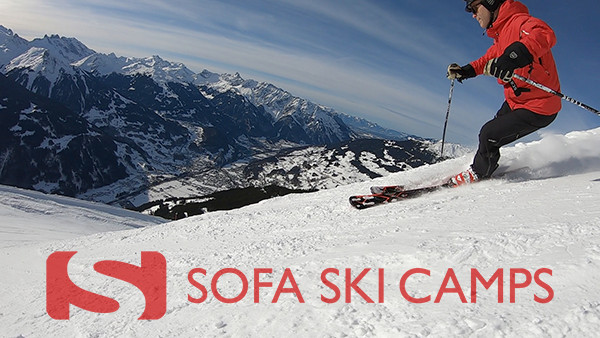Every year I congratulate the people that decide to join us for a Sofa Ski Camp on their decision. Not only because it keeps us busy, but also because it shows that they have a certain mindset when it comes to their skiing, that many others don’t have.
In contrast to most other skiers on the mountain they have decided to get coaching and to work on their skills. If you don’t know skiing then you might say “Well, that’s something that people do in all areas, isn’t it?”. But then you don’t know how it is in skiing.
Skiing has some kind of weird elite macho problem and everybody seems to be expected to pretend that he is a much better skier than he actually is. “I can ski. Of course!” you hear people say as if the question about their skills itself was an insult. (This is probably worse in Austria than it is in New Zealand.)
You should see the surprise in some people’s faces, when they find out that their friend, who sits on the chairlift with me, is actually taking a lesson. “Why do YOU take a lesson?”
In skiing it is obviously not common that people that can ski still take lessons and it seems that the one who does take a lesson, by doing so, admits that he is not a great skier. Where does this come from and why is it so different in skiing than in other sports like golf for example?
Most ski school managers I know complain that their business mainly consists of kids lessons and adult beginner lessons.
In our Sofa Ski Camps the situation is a very different one. Over 70% of our customers in New Zealand have been skiing for more than 10 years and over 50% are advanced/expert skiers that ski the whole mountain. They are all interested in improving their skiing. (The question “I have signed up so I can improve my skiing as much as possible” averaged at 9,8 in 2018. (0 don’t agree, 10 fully agree)).
The ones that ask my students why they are still taking lessons, are often also the ones that believe that you cannot teach an old dog new tricks. They know that they have more shaky moments now than 25 years ago, but they would never consider to get coaching. They would rather spend more money on the newest pair of skis that makes it easier, or on a new ski jacket that makes them look better.
“Stop buying skis, start taking lessons.” One of my YouTube slogans that did not go down so well with some of my ski industry friends…
Last week I came across the term Growth Mindset which led me to the book “Mindset – The new psychology for success” from Carol S. Dweck who coined the term. I since then really enjoyed reading it, as it explains a lot of the things described above and I could relate to many of the stories it tells about students and how they go about learning and their challenges.
People that have a growth mindset don’t mind a challenge. They see a challenge as an opportunity and failure not as something that threatens their ego, but as a chance to get better.
For the last 2 years I finished every email with the quote: „He who stops being better stops being good“ from Oliver Cromwell. For the german speakers it was „Wer aufhört, besser werden zu wollen, hört auf, gut zu sein.“ from Marie von Ebner-Eschenbach. I guess they knew each other.
I felt it was a good fit as the people that get in touch with me to inquire about an instructional, an analysis or coaching, must have that mindset, otherwise they would not email me.
But its not that easy. While it is obvious that it helps to have a growth mindset, or the right attitude, it is tempting when the going gets tough to switch to the dark side.
S: “This ski is great but it does not work so well in the off-piste.” K: “Sure, go wider rather than face it that you had times when you were skiing a lot better on a ski like this than now.”
S: “Today the snow was terrible.” K: “Snow is never terrible. Hardly ever. It’s the skier’s ability that sometimes does not allow them to enjoy it in the same way each time.”
At the Sofa Ski Camps we try to prepare the skiers that sign up to our programme, so they come with the right expectations and so they know that it is normal to struggle and get frustrated, that it is not always easy to have a growth mindset and much easier to blame the snow, the skis, the coach or the weather.
Changing movement patterns and habits takes persistence, patience and time. For a reason our programme lasts for five days and often those five days are just the beginning. A very special friend of mine once wrote a beautiful ski tech article stating that you don’t need the boot camp, all it takes is a little tip here and there, a little lesson with your favourite coach once in a while.
Well, we don’t do tips because we know that changing movements is hard work and takes time. We are not going to lie to you, it might not be easy, but that might also be the reason why its so desirabel. We will help you change your skiing, but you will have to do it yourself. All we can do is to guide you on the journey, to give you the tools and to pass on the knowledge from our own experience that it helps to enjoy the process, to enjoy the training and not just wish to have the result now, that it takes time and some focused work together with a great coach ideally both equipped with a growth mindset.
If it works our students (and coaches) get rewarded with the best turns they (or their students) have ever done, the great feeling of achievement and the hunger for more.
See you soon!
Klaus
Sofa Ski Camps at Treble Cone
Through the introduction of the Sofa Ski Camps to Treble Cone we managed to turn a failing ski improvement product into the biggest ski improvement programme for recreational skiers in the world. More than 50% of over 260 participants in 2019 were returning customers, over 70% are advanced/expert skiers. All are there because they like to work on their skiing, no matter how good they are. The average age is 52, one of our best customers is in his 80s and does three consecutive weeks every winter.
Sofa Ski Camps are currently offered in Austria, Japan and New Zealand for further info visit www.sofaskicamps.com
Carol Dweck: A Summary of The Two Mindsets And The Power of Believing That You Can Improve https://fs.blog/2015/03/carol-dweck-mindset/



Klaus I would to think that I am one of those people that wants to always improve. Started skiing in 1981 so this winter it will be 40 years and yes I still take lessons every time I go skiing , a least 3 days with 3 hour lesson I usually go 3 times every year, I try to stay fit and healthy but at 64 now the recover time is much longer and harder and flexibility is not as good but I always give 100%, why because I really enjoy skiing, There is nothing better than skiing down a fresh powder field , kicking up beautiful S shapes in the fresh snow with very little evert peter dallat ireland
Hi Peter, thank you for leaving the first comment on my new blog! 🙂 I think that taking lessons regularly and getting input for your own skiing definitely makes it even more interesting and lets you discover the breakthrough moments on any level that some only remember from their early ski days. While I sometimes just enjoy the sensation of gliding down a mountain, what drives me most, is to focus on things in my skiing, trying to look for the perfect turn. I am sure it is very different for everybody but I think that some or a lot of input can definitely contribute to keeping it fun and interesting.